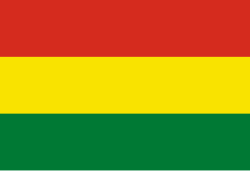| Bolivia at the 1964 Summer Olympics | |
|---|---|
 | |
| IOC code | BOL |
| NOC | Bolivian Olympic Committee |
| in Tokyo | |
| Competitors | 1 in 1 sport |
| Flag bearer | Fernando Inchauste |
| Medals |
|
| Summer Olympics appearances (overview) | |
Bolivia competed at the 1964 Summer Olympics in Tokyo, Japan, which were held from 9 to 24 October 1984. The country's participation in Tokyo marked its second appearance at the Summer Olympics since its debut in 1936, and after a long hiatus between the two Games. The Bolivian athlete delegation consisted of one competitor, canoeist Fernando Inchauste.
Contents
Inchauste competed in the men's K-1 1000 metres event and placed sixth in the heats, advancing him to the repechage round. He placed third in the round and advanced to the semifinals, though did not compete. Thus, Bolivia has yet to win an Olympic medal.